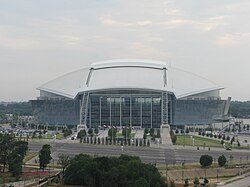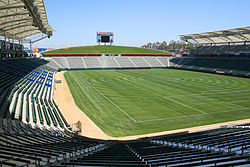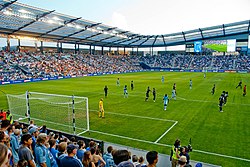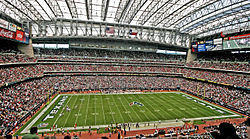Top Qs
Timeline
Chat
Perspective
2011 CONCACAF Gold Cup
11th edition of the CONCACAF Gold Cup From Wikipedia, the free encyclopedia
Remove ads
The 2011 CONCACAF Gold Cup was the 11th edition of the CONCACAF Gold Cup competition, and the 21st CONCACAF regional championship overall in CONCACAF's 50 years of existence. The United States was the host nation.
The competition started on June 5, 2011, at Cowboys Stadium in Arlington, Texas and ended with the final on June 25, 2011, at the Rose Bowl in Pasadena, California,[2] with Mexico beating the United States 4–2.
This competition was the fifth tournament without guests from other confederations. Mexico won their sixth Gold Cup, and ninth CONCACAF Championship overall. It was the third consecutive Gold Cup final and second consecutive win also.
As winner of the tournament, Mexico qualified for the 2013 FIFA Confederations Cup in Brazil as the representative from CONCACAF.[3][4]
Remove ads
Venues
The set of thirteen venues – the same number as the 2009 Gold Cup – was announced on December 16, 2010.[5] Each stadium hosted a doubleheader, except the Rose Bowl which hosted the final.
Remove ads
Teams
Summarize
Perspective
Qualification
A total of 12 teams qualified for the tournament. Three berths were allocated to North America, five to Central America, and four to the Caribbean.
Squads
The 12 national teams involved in the tournament were required to register a squad of 23 players; only players in these squads were eligible to take part in the tournament.
Suspension of Mexican players
On June 9, 2011, the names of five Mexican players were released announcing Christian Bermúdez, Édgar Dueñas, Guillermo Ochoa, Francisco Javier Rodríguez and Sinha, all tested positive for clenbuterol prior to the start of the 2011 Gold Cup. They were withdrawn from the squad a few days after their June 5 Gold Cup starting match and 5-0 win against El Salvador.[6] Mexican officials said they believed the positive tests were caused by eating meat tainted with the drug.[7] CONCACAF General Secretary Chuck Blazer said a meeting of the confederation's national teams committee, which also serves as the organizing committee of the Gold Cup, was to be convened on June 10 to consider the situation, including possibly allowing Mexico to replace the five players. However, the meeting was postponed to allow for more information to be gathered.[8] The Mexican Football Federation said on June 14 that the "B" samples of those five involving players were negative.[9] The CONCACAF Gold Cup Organizing Committee announced on June 19 that Mexico would be allowed to replace the suspended players.[10] The replacement players were, Luis Ernesto Michel, Héctor Reynoso, Paul Aguilar, Marco Fabián, and Hiram Mier.[11] All players were later acquitted by the Mexican Football Federation and the results were blamed on contamination of meat, with the ingestion of clenbuterol considered non-intentional.[12] However, the World Anti-Doping Agency (WADA) appealed to the Court of Arbitration for Sport to request a ban.[13] On October 12, 2011, WADA withdrew the request after the full file was available for them.[14][15]
El Salvador match fixing
On September 20, 2013, the Salvadoran Football Federation banned 14 Salvadoran players for life due to their involvement with match fixing while playing with the El Salvador national team over the previous two years, including 8 players (Dennis Alas, Luis Anaya, Marvin González, Reynaldo Hernández, Miguel Montes, Dagoberto Portillo, Osael Romero, and Ramón Sánchez), from El Salvador's 5–0 loss to Mexico on June 5, 2011 Gold Cup match.[16]
Remove ads
Group stage
Summarize
Perspective
All Times are U.S. Eastern Daylight Time (UTC−4) (Local Times in parentheses)
Group A
Group B
Group C
Ranking of third-placed teams
Remove ads
Knockout stage
Bracket
| Quarter-finals | Semi-finals | Final | ||||||||
| 19 June – District of Columbia | ||||||||||
| 0 | ||||||||||
| 22 June – Houston | ||||||||||
| 2 | ||||||||||
| 1 | ||||||||||
| 19 June – District of Columbia | ||||||||||
| 0 | ||||||||||
| 1 (5) | ||||||||||
| 25 June – Pasadena | ||||||||||
| 1 (3) | ||||||||||
| 2 | ||||||||||
| 18 June – East Rutherford | ||||||||||
| 4 | ||||||||||
| 1 (2) | ||||||||||
| 22 June – Houston | ||||||||||
| 1 (4) | ||||||||||
| 0 | ||||||||||
| 18 June – East Rutherford | ||||||||||
| 2 | ||||||||||
| 2 | ||||||||||
| 1 | ||||||||||
Quarter-finals
Semi-finals
Final
Remove ads
Statistics
Goalscorers
There were 80 goals scored in 25 matches, for an average of 3.2 goals per match.
7 goals
4 goals
3 goals
2 goals
1 goal
 Randall Brenes
Randall Brenes Joel Campbell
Joel Campbell Dennis Marshall
Dennis Marshall Heiner Mora
Heiner Mora Álvaro Saborío
Álvaro Saborío Yénier Márquez
Yénier Márquez Arturo Álvarez
Arturo Álvarez Léster Blanco
Léster Blanco Eliseo Quintanilla
Eliseo Quintanilla Osael Romero
Osael Romero Clive Murray
Clive Murray José Javier del Aguila
José Javier del Aguila Carlos Gallardo
Carlos Gallardo Marco Pappa
Marco Pappa Walter Martínez
Walter Martínez Alfredo Mejía
Alfredo Mejía Omar Daley
Omar Daley Luton Shelton
Luton Shelton Efraín Juárez
Efraín Juárez Rafael Márquez
Rafael Márquez Blas Pérez
Blas Pérez Michael Bradley
Michael Bradley Landon Donovan
Landon Donovan Clarence Goodson
Clarence Goodson Jermaine Jones
Jermaine Jones
1 own goal
 Clarence Goodson (against Panama)
Clarence Goodson (against Panama)
Remove ads
Awards
The following Gold Cup awards were given at the conclusion of the tournament: the Golden Boot (top scorer), Golden Ball (best overall player) and Golden Glove (best goalkeeper).[17][18][19][20]
Remove ads
References
External links
Wikiwand - on
Seamless Wikipedia browsing. On steroids.
Remove ads














